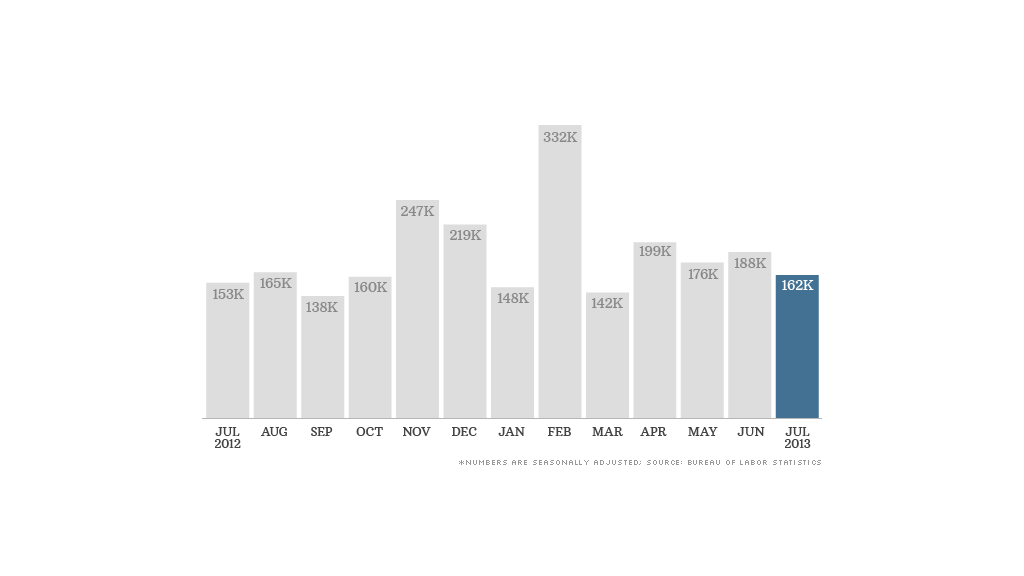
The job market hit a speed bump in July, as hiring slowed and both hours worked and wages fell slightly.
The U.S. economy added 162,000 jobs, marking the slowest month for hiring since March, the Department of Labor said Friday. Economists surveyed by CNNMoney had predicted employers added 180,000 jobs. Stocks slipped at the opening bell, following the report.
"It was a bit of a disappointment," said Sal Guatieri, senior economist with BMO Capital Markets. "We're continuing to see moderate but unspectacular job growth in the U.S. and that's consistent with an economy that's growing at a modest rate."
The report was discouraging in many regards. While the unemployment rate fell slightly to 7.4%, the drop was partly because 37,000 people dropped out of the labor force.
Only about 63% of Americans over age 16 participate in the job market -- meaning they have a job or are looking for one. That rate has been hovering recently around its lowest level since 1979.
The make-up of job growth was also disappointing.
Hiring in July was concentrated in sectors typically characterized by low-wage jobs: Retailers, for example, added 47,000 jobs and restaurants and bars hired 38,000 workers.
July's job growth was also below the average monthly gains over the past year, and revisions to June and May figures show that the economy added 26,000 fewer jobs than originally reported.
Meanwhile, the average workweek fell slightly, and average wages fell by about 2 cents to $23.98 an hour.
Share your story: Are you working part time, but would rather work full time?
A survey of households showed workers got far more part-time jobs than full-time jobs, and the number of self-employed workers increased dramatically in July. But data from that survey are notoriously volatile, and economists cautioned against reading too much into just one month's numbers.
Earlier in the week, the Commerce Department reported that the economy grew at slow rate in the second quarter, equivalent to about 1.7% a year. Many economists, including those at the Federal Reserve, expect economic growth to accelerate later this year.
"I don't think it's time to press the panic button," Guatieri said. "We still think the economy will pick up in the second half of the year as some of the fiscal headwinds abate."
The Federal Reserve has said it wants to see the outlook for the job market improve "substantially" before it will be ready to start gradually reducing its monthly bond-buying program -- known as QE3. Weakness in the July jobs report could mean the central bank will hold off on beginning to taper QE3 until later in the year.

Although the job market has improved over the past few years, it still has a way to go before it fully recovers from the Great Recession.
Overall, the U.S. economy lost 8.7 million jobs in the financial crisis, and has since gained back 6.7 million jobs.


